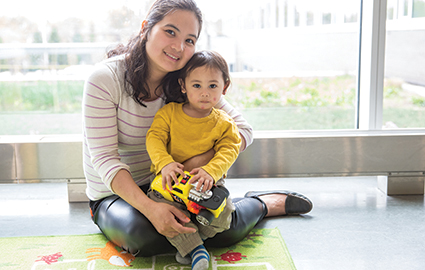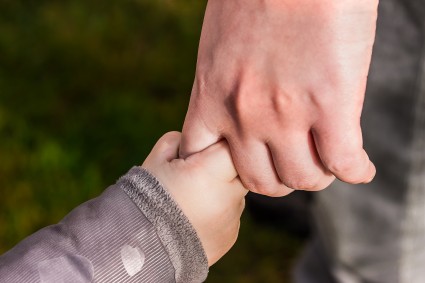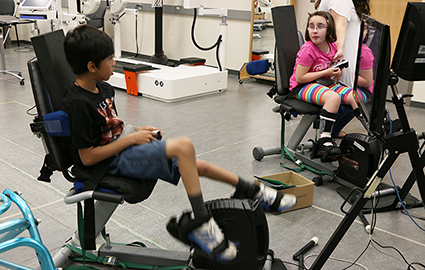Stories of impact are ideally told by partners, collaborators and end users of our research.
High Impact Projects
Four of the Network’s funded projects with the highest potential for creating impact on diagnosis, treatment and services by 2020 were designated for special in-depth mobilization consultation. During day-and-half intensive meetings, our Knowledge Translation (KT) Team worked closely with the selected project teams to include partners in the consultation, and produce a plan encompassing activities, timelines, translation and/or commercialization goals, and metrics for evaluating the impact of the project. Progress was mapped and staged utilizing the Co-Produced Pathway to Impact, the Network’s roadmap for our research, KT and commercialization activities.
The four High Impact Projects include:
- The Social ABC’s an intervention for toddlers showing early signs of autism, targeting language development,
- MYmind, an 8-week meditation intervention for youth with autism and their parent
- Hand in Hand, a screening and intervention program for at-risk infants and toddlers involved with Children’s Aid, and
- The Liberi Exergame, a recumbent bicycle equipped with gaming software adapted for youth with Cerebral Palsy
Projects selected for the consultation process were chosen based on readiness for achieving implementation by partners, potential for scaling well beyond the initial research project, and/or commercialization potential.
Social ABCs
Early diagnosis and intervention can improve mental health and valuable social and self-regulation skills in young children with autism. The Social ABCs, a parent-facilitated intervention for toddlers aims to develop social and language skills in children showing early signs of autism, or atypical communication. With guidance from trained coaches, parent learn to promote these capacities through everyday activities and interactions. “Parent-mediated interventions are less resource-intensive and therefore less costly,” says Social ABCs co-developer Dr. Jessica Brian (Holland Bloorview). “Social ABCs provides an opportunity to work with kids who don’t yet have a formal diagnosis. Even when parents are very vigilant, their child might not get assessed until they are three or four years old. We know that with autism, earlier is better.”

Impacts of the Project
The Social ABC’s successful multi-site feasibility study and trial in the Humber College daycares prompted a community extension pilot in Ontario. Offered in partnership with Hamilton Health, the pilot may lead to wider offering of Social ABC’s throughout the province. Two manuals have been developed to support further work, one for parents, and a second one for coaches.
MYmind
Previous research has shown that mindfulness not only helps to improve attention and focus, but can also be effective in reducing stress, increasing control over negative feelings, and improving quality of life. Dr. Jonathan Weiss led a KBHN research project that examined whether participation in MYmind, a mindfulness training program designed for teens and young adults with autism and their parents, improved outcomes.
Originally developed and tested by researchers in the Netherlands, MYmind aims to have families experience the benefits of mindfulness meditation and cognitive therapy techniques while learning to relate to one another in a new way.

Impacts of the Project
The MYmind project ran three cohorts through the pilot program. Altogether, 24 parent-teen pairs participated. Following the project, many parents reported closer relationships and improved communication with their children. Most youth reported improvement in their ability to manage stress and negative emotions, and an increase in self-esteem and awareness of their own and others’ feelings.
Four graduate students and two post-doctoral fellows were trained to support the program, building the capacity of trained professionals for the future. The MYmind team also provided this training to 25 clinicians, who are now more able to deliver mindfulness based therapy to individuals with ASD and their families. One youth stated, “it’s inspiring to think how there are programs…that can help us get through life’s difficulties.” Data collection is complete, and the team is analyzing the results. MYmind partner the Geneva Centre for Autism, as well as Lake Ridge Community Support Services are now running mindfulness-based programs for people with autism in the community, which means the project led directly to improved community-based capacity in mental health services.
Hand in Hand
The Screening and Intervention for At-Risk Infants & Toddlers and Infant Mental Health Promotion project, known as Hand in Hand, is investigating the impact of early screening and intervention for children aged 0-5 in the foster care system, who are at risk of developmental delay due to early life trauma and/or prenatal drug and alcohol exposure. Rooted in a partnership between our FASD Research Team and Infant Mental Health Promotion at SickKids, the collaboration has developed a three-part training model for front-line workers supervising children in care. The training focuses on the significance of infant mental health and early development, the use and interpretation of the Ages and Stages Questionnaires as developmental screening tools, and the creation of developmental support plans to address areas of concern for at-risk children.

Impacts of the project
Hand in Hand has built capacity within multiple agencies across Canada that were unfamiliar with infant and early mental health. Over the past year, 155 frontline workers received training and reported significant improvement in their confidence surrounding infant mental health that will directly impact their approach to supporting children and families. Hand in Hand is also leading to changes in policy and practice. For example, the Ontario Association of Children’s Aid Societies is working to embed mandatory infant mental health training into their child welfare programming to suit the needs of workers across Ontario. Other partners include the Ontario Centre of Excellence on Child and Youth Mental Health, the Timiskaming Elder’s Council, and the Government of Alberta.
Liberi Exergame
The brainchild of Dr. Darcy Fehlings (Holland Bloorview) and Dr. Nicholas Graham (Queen’s University), the Liberi Exergame involves a customized exercycle whose pedals, powered by youth with CP, run customized multi-player videogames played both remotely and in person via headsets. A pilot trial of the exercycle demonstrated cardiovascular benefits, as well as what one study participant described as life-changing impacts on his social life. The dual impact is very encouraging to both researchers and teens in the study. Physical activity in this age group often dwindles, and social isolation increases.
After promising initial pilot studies, KBHN’s researchers set out to extend the games to allow youth with different levels of physical functioning and ability to play together, and trial Liberi with children with FASD, to evaluate the quality of exercise provided by the games.

Impacts of the Project
One hundred children and youth with CP involved in community-based evaluation of Liberi through funding from the BC Government experienced improved fitness and physical literacy. BC funding is helping support the transition of the Exergame from a research project to a commercially available product with reach beyond initial pilot sites. Through home deployment, Liberi can provide access to physical activity for children in rural and remote locations that may not support specialized centres for children with neurodisabilities.


